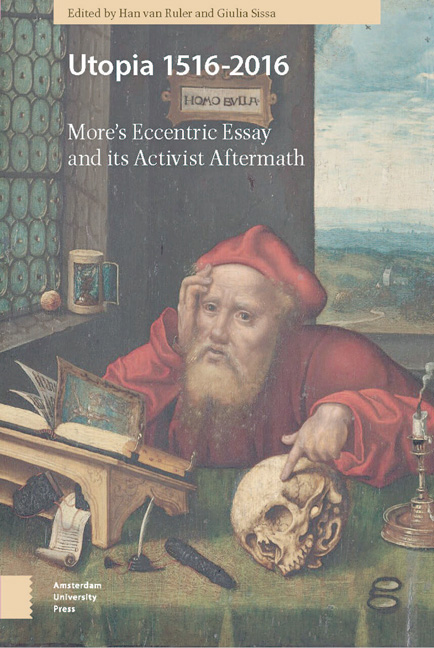Book contents
- Frontmatter
- Contents
- Introduction
- PART 1 THE BOOK
- A Praise of Pain: Thomas More’s Anti-utopianism
- Bodies, morals, and religion: Utopia and the Erasmian idea of Human Progress
- PART 2 ORIGINAL RECEPTION
- Realism Vs Utopianism: The Problem of the Prince in the Early-Modern Netherlands
- From Thomas More to Thomas Smith: Utopian and Anti-Utopian Understandings of Economic Change in Sixteenth-century England
- PART 3 PHILOSOPHICAL CRITICISM
- Reflections on the Utopian Mind
- Utopianism in Today’s Health Care
- PART 4 PHILOSOPHICAL ACCLAIM
- Utopianism and its Discontents: A Conceptual History
- The integrity of Exacerbated Ambiguity: More’s Utopia as an Evaluative Thought Experiment
- Index
A Praise of Pain: Thomas More’s Anti-utopianism
Published online by Cambridge University Press: 12 December 2020
- Frontmatter
- Contents
- Introduction
- PART 1 THE BOOK
- A Praise of Pain: Thomas More’s Anti-utopianism
- Bodies, morals, and religion: Utopia and the Erasmian idea of Human Progress
- PART 2 ORIGINAL RECEPTION
- Realism Vs Utopianism: The Problem of the Prince in the Early-Modern Netherlands
- From Thomas More to Thomas Smith: Utopian and Anti-Utopian Understandings of Economic Change in Sixteenth-century England
- PART 3 PHILOSOPHICAL CRITICISM
- Reflections on the Utopian Mind
- Utopianism in Today’s Health Care
- PART 4 PHILOSOPHICAL ACCLAIM
- Utopianism and its Discontents: A Conceptual History
- The integrity of Exacerbated Ambiguity: More’s Utopia as an Evaluative Thought Experiment
- Index
Summary
Abstract
In his incarnation as ‘Morus’ in Utopia, Thomas More asserts his profound disagreement with his fictional character, Raphael Hythlodaeus. Whereas Hythlodaeus extols the merits of commonality and the moral value of pleasure, Morus dismisses the whole project as absurdity, or hopeless wishful thinking. This divergence has been variously interpreted, but mostly played down. This paper argues that the civilized, amicable, and yet genuine discord between Raphael Hythlodaeus and Morus is the key to Utopia. We can appreciate its importance only if we understand who Hythlodaeus is, and what the purpose of the dialogue is. We also have to do justice to Thomas More's politics, which were grounded on the authority of the Christian tradition, in the Old and the New Testament. Over the years, Thomas More maintained a very clear and consistent line of thought on the legitimacy of worldly wealth, the responsibilities inherent in its management, the imperative to curb their enjoyment, the temptation of ‘business’ and greed, the duty of charity, and the value of penance, remorse, prayer, and other kinds of selfinflicted suffering. In A Dialogue of Comfort against Tribulation, Anthony, the wiser character, conveys Thomas More's relentless praise of pain. Anthony has the last word. So, too, does Morus.
Keywords: pleasure, pain, commonality, property, wealth, poverty, charity, business, greed, pride, friendship, civility, disagreement, original sin, absurdity, wish, hope, nowhere, never, always, anxiety, security
Introduction
Utopia is excellent. Its excellence is political, moral and emotional. Under the enlightened government of their elected kings, the inhabitants of this new island conduct an existence that is virtuous and minimally anxious. Nature inspires them ‘to lead a life as free of anxiety (quam licet minime anxiam), and as full of joy as possible and to help all one's fellow men towards that end’. Neither vices, such as greed and pride, nor troubling passions, especially fear, have a place in the ‘optimal state of a commonwealth’. The Utopians enjoy full security in their livelihood (victus illa securitas) at home. The anxious care of thinking about the future of one's family (anxia cogitandi cura) is eliminated. Whereas ‘that sort of concern (solicitudo) often breaks the most generous spirits,’ securitas renders the Utopian soul sublime and disdainful of being defeated.
- Type
- Chapter
- Information
- Utopia 1516-2016More's Eccentric Essay and its Activist Aftermath, pp. 25 - 70Publisher: Amsterdam University PressPrint publication year: 2017



